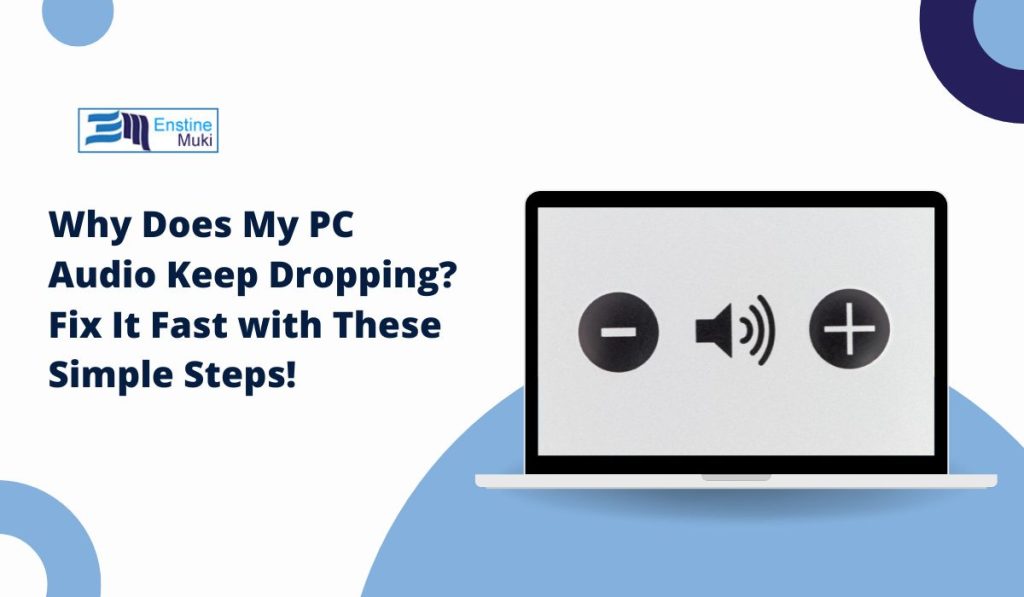Why Does My PC Audio Keep Dropping?
There are a few common reasons why your PC audio might keep dropping:
- Automatic Volume Adjustments:
Windows or certain apps sometimes change the volume without you noticing. For instance, if you’re on a call using Zoom or Skype, these apps may automatically lower the sound of other programs, like music or videos, to help you hear the person talking more clearly. - Outdated Audio Drivers:
Drivers are like the “brains” of your computer’s sound system. If they’re outdated or not working properly, they can cause issues with your audio. Updating or reinstalling these drivers often solves the problem. - Faulty Connections:
Sometimes the issue isn’t with your software, but your hardware. If your headphone jack or speakers aren’t plugged in properly, it can cause the audio to cut out or drop in volume. - Windows Settings:
Did you know Windows has a feature that automatically lowers the sound when it detects communication, like a video call? If this feature is on, it can cause your volume to change, even when you don’t want it to.
How to Fix Your PC Audio Volume Problem
Now that you know why this happens, let’s go over how to fix it. Follow these steps to get your sound working properly again:
1. Turn Off Automatic Volume Adjustments in Windows
Windows sometimes tries to help by lowering the sound during calls. You can turn this off by following these simple steps:
- Go to the Control Panel and click on Sound.
- Click the Communications tab.
- Select Do nothing under the section that says, “When Windows detects communications activity.”
- Hit Apply, then OK.
That should stop Windows from automatically lowering your volume!
2. Update or Reinstall Your Audio Drivers
Your audio drivers might be outdated or faulty. Here’s how to fix them:
- Press the Windows key and type “Device Manager.”
- Open Device Manager and find Sound, video, and game controllers.
- Right-click on your audio device and choose Update driver.
- If the driver is up-to-date and the problem still happens, you might need to uninstall the driver and restart your computer. It will automatically reinstall the correct driver.
3. Check Your Hardware
Make sure your headphones, speakers, or any audio cables are plugged in properly. Loose connections can cause the volume to drop randomly. If you’re using external speakers, check that they’re powered on and working.
4. Check Your App Settings
Some apps, like Zoom or Skype, automatically adjust the volume. Check the audio settings in these apps and disable any option that says something like “Automatically adjust microphone volume” or “Lower the volume of other applications when I’m speaking.”
How to Prevent PC Audio Issues in the Future
To avoid running into this problem again, here are some simple things you can do:
- Keep your audio drivers updated. Make sure to check for updates regularly.
- Check your Windows settings and make sure the communications feature is set to “Do nothing.”
- Test your hardware to make sure your headphones and speakers are working properly and connected securely.
By doing these things, you can make sure your audio stays consistent, and you won’t have to deal with volume drops anymore.
Conclusion: Easy Fixes for Annoying Audio Problems
PC audio issues can be frustrating, especially when the sound keeps lowering on its own. The good news is the fix is usually simple. Whether it’s turning off automatic volume adjustments, updating drivers, or checking hardware, you now have the tools to get your sound back to normal.
If you’ve tried these steps and still have problems, you might want to reach out to a tech expert or your PC manufacturer for more help.
Have you had issues with your PC audio? Did these fixes work for you? Let us know in the comments below! And if you found this guide helpful, share it with friends or family who might be struggling with the same problem. Stay tuned for more helpful tech tips!

